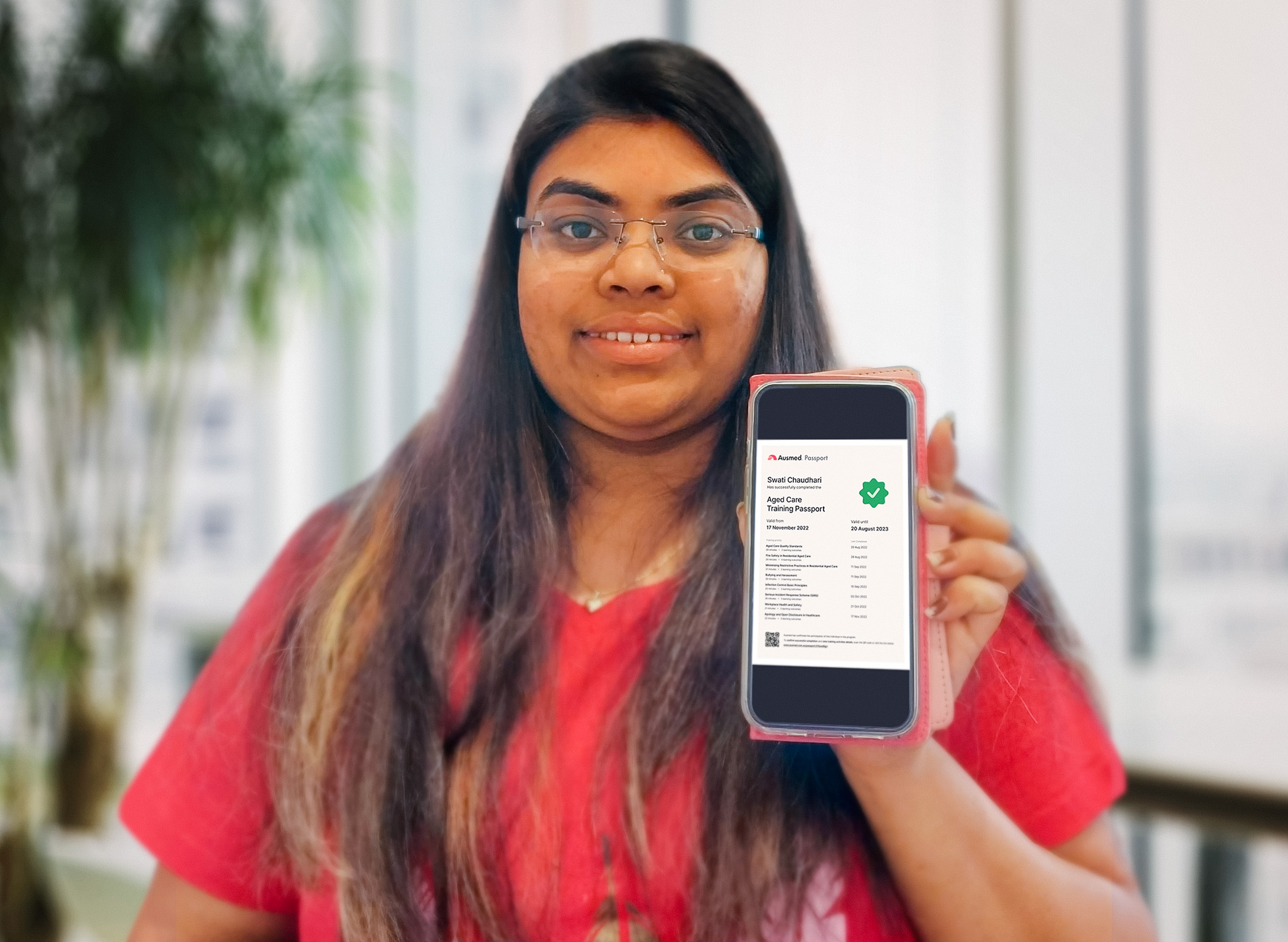A free digital passport developed by CPD education provider Ausmed to reduce staff training costs for aged care providers is rolling out across Australia.
The tool was launched at the Aged and Community Care Providers Association conference in October 2022 with more than 50 aged care providers from residential and home care signing up. There are now more than 60 at various stages of rolling it out with more than 1500 individual passport holders using the app.
The digital certificate for the Australian aged care workforce is an onboarding tool that allows new staff to show providers the training modules they have completed, enabling them to avoid repeating training when moving between providers.
The training solution fast-tracks mandatory training and enables sector-wide standardisation of eight mandatory training areas. Workers can carry it with them from one employer to the next to prove they have completed core training relevant to and recognised by the sector.
According to Ausmed, the industry’s high turnover can lead to a burden of onboarding costs with new employees. The estimated spend on repeated mandatory training in the Australian aged care sector was $8.02 million in 2018. This avoidable cost is expected to jump nearly 300 per cent to almost $32 million by 2030.
The tool is aimed at reducing onboarding duplication by recognising previous mandatory training and may be able to reduce upfront employment costs by about $128 for each new starter.
Ausmed CEO Will Egan said the Ausmed Aged Care Training Passport meant employees could start a new job with less training time and get on the floor faster.
“The Ausmed Passport has been a collaboration of client request, industry need and Ausmed innovation,” he told Pulse+It. “The first iteration of the idea came from a client who was challenged by the high turnover of staff they found in the aged care industry and the burden of onboarding costs.
“The final iteration has combined key insights from an industry panel and Ausmed’s agile and innovative product design. All in all, the foundations of the Ausmed Passport development remain in the aged care industry’s unregulated workforce and its need to have consistency, commonality, and transferability to its onboarding cohorts.”
How does it work?
Providers add the passport training modules to their current induction training plan or create a new one. Prior learning is recognised as complete while outstanding training is assigned to staff.
Providers use the passport to fast-track new starters through the induction process by asking them to provide their verifiable certificate with their CV and storing a copy in their human resources (HRIS) or learning management systems (LMS) for audit.
In addition to induction training, providers can use the passport for eight annual mandatory modules. On completion, Ausmed issues staff with a digital certificate and ensures the passport holder renews their training annually to remain valid. Workers can download their certificate or receive a unique URL that can be shared with anyone including employers and on LinkedIn.
It takes about 3.5 hours to complete the eight core learning outcomes in the passport. They cover aged care quality standards, fire safety in residential aged care, minimising restrictive practices in residential aged care, bullying, harassment and discrimination in the workplace, infection prevention and control, the serious incident response scheme, workplace health and safety, and apology and open disclosure in healthcare.
Mr Egan said passport holders whose aged care provider recognised the passport in their own learning system could just show or email their certificate for acknowledgment of recognised mandatory modules.
“For those employees whose aged care provider has the Ausmed learning management system, their digital certificate is recognised behind the scenes and automatically validated,” he said.
“Either method means that the employee can kick off their new job with less training time and get on the floor faster, making this a very efficient onboarding tool for aged care providers.”
Providers can also align external service provider training with their internal training, and other benefits include easily proving their training compliance to the Aged Care Quality and Safety Commission.
Free for individuals and employers
The passport is free for the aged care workforce, agency and catering staff and TAFEs including organisations that don’t use Ausmed’s LMS.
“Strategically speaking, no program attempting to standardise the basic fundamental training taking place during induction to the Australian aged care industry would work if there was a financial barrier preventing individuals and employers from participating,” Mr Egan said. “It’s imperative that initiatives like this are cost neutral.”
Rockpool Residential Aged Care in Queensland was one provider that jumped at the innovation.
“As a relatively new organisation, Rockpool is exploring and considering ways in which we can engage and collaborate with like-minded industry partners,” Rockpool’s executive manager for quality, compliance and innovation, Desma-Ann van Rosendal, said.
“Rockpool has a ‘people plan’ which includes strategies for attracting and retaining an engaged and diverse workforce.
“We believe partnering with an organisation like Ausmed provides the opportunity for us to be innovative, reduce onboarding duplication and concentrate on sharing what makes us great with our new team members.”
Ausmed won an innovAGEING award in association with McKenzie Aged Care Group last year for using the tool to increase care and service productivity.
